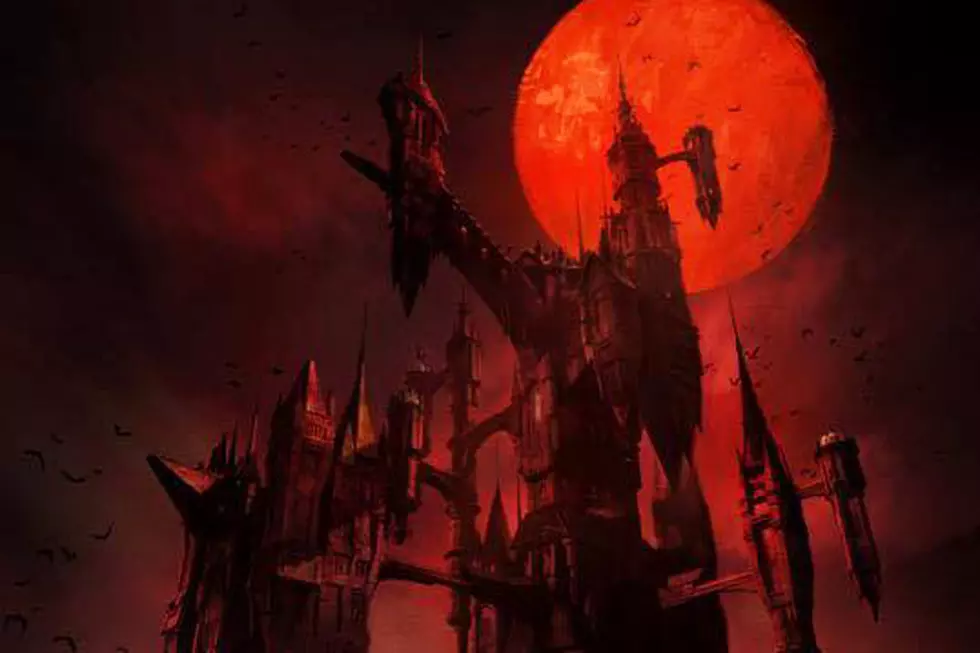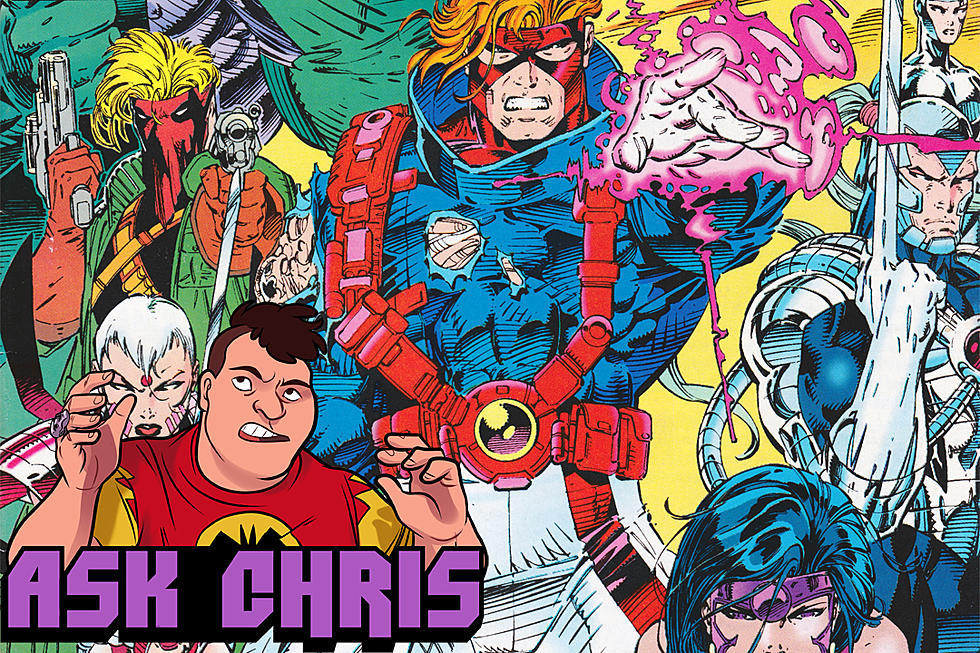
Hot Ink Reviews: Planetary #27, X-Babies, Doctor Voodoo
ComicsAlliance's Chris Murphy reviews the biggest -- and best -- books coming out this week.
AND AT LAST WE ARRIVE AT THE END -- Planetary #27

I believe I may be required by law in this review to address the following topic first: This week Wildstorm is releasing the 27th and final issue of Warren Ellis and John Cassaday's Planetary. The series premiered with issue one way back in the spring of 1999 and in 2000 was nominated for the Eisner award for "Best Continuing Series." It did not win. I'd like to think that on some subconscious level that loss so irked the creators that it led to "Planetary" becoming the "Worst Series at Continuing" for the rest of a run that now concludes more than ten years after it began.
It made it from 1999 - 2001 at a decent clip, but then released no issues in 2002, only eleven issues from 2003 - 2006, and issue 27 marks the first issue to hit shelves since issue 26 did almost three years ago. If you bought "Planetary" #1 the day it was released, read it, then that night conceived a child, today that child would now be old enough that you should be hiding your other Warren Ellis comics from them lest they get a look and end up scarred for life.And what makes it so terribly infuriating is how good the book's been over all that time. Future generations of comic readers who'll simply be able pick up a deluxe hard-bound collection of "Planetary" will never be able to truly understand what we went through, in the same way that people of my generation are never going to be able to understand what it must have been like for an earlier generation to wait three years between "The Empire Strikes Back" and "Return of the Jedi."
On the other hand, it almost feels appropriate that there was a three year break between "Planetary" #26 and the final note struck in the last issue. When last we saw Elijah Snow, Jakita Wagner and the Drummer they had finally triumphed over the villains of the series, Dr. Randall Dowling and the rest of The Four. As the last issue opens, Snow and The Planetary Organization are busy taking the technological marvels that Dowling had hidden from the rest of mankind and using them to make the world a better place.
The idea that winning such a struggle is often only the beginning of changing the world is rarely explored in comics. In normal mainstream superhero books the story never truly ends, and so there is no tale of the heroes winning the peace. There's always more evil to fight. In a limited series that may only have six or twelve issues there's barely time for an epilogue. And even in a longer one the story's often over after the big fight: "And everyone lived happily ever after unless they heroically sacrificed themselves, The End."
Our culture seems to believe that the point of winning is winning. It's a result of the popularity of pro sports and video games, where ultimately all you're getting if you win is bragging rights. There are no greater rewards to be had, aside from the occasional prize payout. No new responsibilities, no new opportunities to change your life or the lives of others for the better. But even in such varied areas as politics, war, and the entertainment industry, subject matter is almost always covered in a way that focuses on who will win and what they will do in order to win, with minimal attention paid to what that victory will mean and what comes next.
"Planetary 27" reminds us that when we fight it's for a reason, and that the legacy we create after victory has been achieved is going to do far more to determine our lasting happiness than the simple act of being a winner ever will. It's also a reminder that while all that wonderful comic book and action movie violence can be effective at preventing people from making things worse, it takes an entirely different skill set to actually make things better afterwards. I don't want to give too much away in regards to the specifics of the final issue's plot, but I was pleased with how the story concluded for each major character and with seeing how they'd grown over the course of the series. It left me looking forward to finally picking up a big collected edition and rereading "Planetary" from start to finish all at once.
 IN ALL LIKELIHOOD THE INK USED TO PRINT THIS COMIC CONTAINS PUPPY AND KITTEN SHAVINGS X-Babies #1
IN ALL LIKELIHOOD THE INK USED TO PRINT THIS COMIC CONTAINS PUPPY AND KITTEN SHAVINGS X-Babies #1
While today companies capitalize on their popular characters by making alternate versions of them that are zombies, matters have not always been this way. Once there was a time where companies looking to make a quick buck would make cute, child versions of their ensemble casts. Mostly thanks to the one show so successful that most people of roughly my age are now incapable of hearing the phrase "(fill in the blank) Babies" without getting the theme song stuck in our head for hours. So you can guess what I was humming to myself while reading "X-Babies" #1.
These aren't exactly new creations (their original appearance is included as a reprint at the end of the book), but it's been a while since Marvel paid a visit to the X-Babies, childlike versions of the X-Men who star in a popular show televised on Mojoworld. But baby Cyclops, Storm, Rogue, Colossus, Nightcrawler, Wolverine and Kitty Pryde are in for a surprise. As the first issue of the series begins, they discover there's been a coup, Mojo's been deposed as head of programming, and they've been replaced with the more popular "Adorable X-Babies," even younger, even cuter versions of the X-Men.
It's a great twist, as people coming to the comic for the cuteness now have something even cuter to look at, and the readers who hate cute things but feel compelled to pick up every X-Men book that gets released immediately side with our protagonists against the even more horrifyingly cute obstacle placed in their path. The personalities of the characters are well modified into their younger versions. There's a great panel where they all stand watching the even cuter babies in mortified shock. All, that is, except for Kitty Pryde, who's looking up with fascination as if she's deeply contemplating the new show and its story and moral. The endless child-swears made up for baby Wolverine represented most of the enjoyment I got out of this, especially the time when he keeps calling baby Cyclops a "dink" until Cyclops loses it and shoots Wolverine in the back of the head. Which is not as difficult as it seems, considering the head makes up slightly less than one half of each character's total body mass. And there was even a decision to have baby Storm experience a surprisingly non-cute panic attack brought on by claustrophobia, which is ultimately useful to the X-Babies' escape plans.
All that being said, this is a comic that's very much exactly what it appears to be on the cover. You're probably either excited or repulsed by the idea of X-Men characters designed to be brain-meltingly adorable. I'll admit the fight scenes were fun, but then I like things that are cute and unpredictably violent. It's why I'm a cat person. Plus I was intrigued by one of the characters that appears on the last page looking like Oscar the Grouch on uppers with a jetpack. In the end, though, the total result is one that's not surprisingly better than you'd expect, but neither is it underwhelming. If the one sentence long premise to this book sounds good to you, chances are you'll have a good time reading it. As for me, I'm going to hold out for Punisher Babies.
FEATURING MORE DOCTORS THAN THE AVERAGE PRIME TIME DRAMA LINEUP -- Doctor Voodoo: Avenger
of the Supernatural #1
 The Marvel Universe's newest sorcerer supreme kicks off his own title this week in writer Rick Remender and artist Jefte Palo's Doctor Voodoo: Avenger of the Supernatural. As a lesser known hero stepping into the shoes of retired sorcerer supreme Doctor Strange, Jericho Drumm immediately sets about proving that he's not one to be trifled with. Having recently upgraded his credentials from Brother Voodoo to Doctor Voodoo, with an advanced degree seemingly a requirement to hold the Eye of Agamotto, issue 1 starts with a face off with Dormammu. And although he's an immensely powerful demon ruling over his own dimension, he is not a Doctor and thus is not worthy of holding the Eye. Advantage Voodoo.
The Marvel Universe's newest sorcerer supreme kicks off his own title this week in writer Rick Remender and artist Jefte Palo's Doctor Voodoo: Avenger of the Supernatural. As a lesser known hero stepping into the shoes of retired sorcerer supreme Doctor Strange, Jericho Drumm immediately sets about proving that he's not one to be trifled with. Having recently upgraded his credentials from Brother Voodoo to Doctor Voodoo, with an advanced degree seemingly a requirement to hold the Eye of Agamotto, issue 1 starts with a face off with Dormammu. And although he's an immensely powerful demon ruling over his own dimension, he is not a Doctor and thus is not worthy of holding the Eye. Advantage Voodoo.
A real obstacle appears later in the issue in the form of another challenger for possession of the Eye, Doctor Doom. This time Voodoo not only faces an adversary bearing the necessary honorific to remove the artifact from his possession, he's also confronted with uncertainty. Voodoo's been told the Eye was given to him because only he possesses the talents needed to save the world from the prophesied arrival of a great evil. Doom, perhaps like some Marvel readers, has his doubts about Voodoo's capabilities and feels that he would be better suited to hold the power of the Eye. Doom is also not the type of individual who expresses his feelings with polite conversation when laser blasts can get the same job done. And for a man who is thwarted in almost every attempt he ever makes to do anything, Doom is still able to give off the aura of a man who can be counted on to do what must be done. Now that his admitted motivation is actually saving the world, his egotistical grandiose pronouncements demand more consideration than usual.
By the end of the first issue, Doctor Voodoo has survived a trial by fire and gone a long way towards establishing himself as a Sorcerer Supreme able to hold his own, and at the same time readers are given the smallest glimpse of the incredible danger he's about to face. While I wouldn't say I came away from "Doctor Voodoo: Avenger of the Supernatural" #1 convinced that I should keep following the series, it was an impressive introduction to a character I wasn't at all familiar with before picking this one up.
More From ComicsAlliance

![Jenny Sparks Enters The Scene In Ellis And Davis Hunt’s ‘The Wild Storm’ #3 [Preview]](http://townsquare.media/site/622/files/2017/03/TWS_Cv3_000.png?w=980&q=75)







